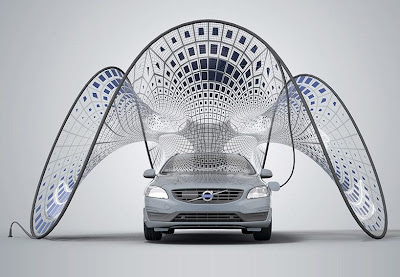Most Amazing The Pavilion Protects Your Car and and VOLVO Developers The 'NO DEATH' CAR
Most Amazing The Pavilion Protects Your Car and and VOLVO Developers The 'NO DEATH' CAR
Although solar power is a resource that most of us agree we should be taking far more advantage of, the truth is that solar panels are often just as visually uncool as they are inefficient relative to other sources of energy. However, as manufacturing processes evolve to allow for more adventurous designs, the shift to aesthetically pleasing solar harvesters is gathering momentum, as exemplified by this new device created as an add-on to Volvo's V60 electric vehicle.
Designed by Los Angles-based architecture studio Synthesis, the idea is the winner of the international "Switch to Pure Volvo" competition that called for an innovative solution to showcase the automaker's latest electric vehicle. The collapsible pavilion uses integrated photovoltaic panels tensioned over carbon fibre rods to create an attractively futuristic butterfly wing-like covering that both protects the car from the elements and acts as a kind of power supply.
When the driver is ready to move to another location, the solar pavilion easily folds up into a housing that can be stored in the vehicle's trunk, making the seemingly unwieldy back-up power supply actually quite practical. Synthesis claims that the pavilion can also effectively capture energy from indoor artificial lighting as well.
Car giant Volvo is developing 'no death' cars that drive themselves and are impossible to crash - ready for launch in showrooms within eight years.
The computerised vehicles will be fitted with high-tech sensors and will 'refuse to be steered' into other objects.
Volvo says they will be on sale to customers by 2020, but that some of the life-saving technology will be incorporated into its vehicles even earlier - from 2014 - it says.
The car will be fitted with dozens of sensors allowing it to monitor both pedestrians and other traffic, and
take action to avoid collisions. Volvo claims by 2020 it can eradicate accidents and deaths in its vehicles.
Volvo's head of government affairs Anders Eugensson said: ‘Our vision is that no one is killed or injured in a new Volvo by 2020.’
Swedish-based Volvo - now owned by China's Geely group - said the first versions of its crash-free cars would meant for driving in towns at a maximum speed of 31mph.
It is part of the race by leading car manufacturers including Volvo, Ford Mercedes-Benz, BMW, Vauxhall and even Google to build fully autonomous ‘Robo-cars’ that can drive themselves - like the one which actor Will Smith drove in the sci-fi movie ‘I, Robot.’
THE FUTURE OF DRIVING
Ford’s global chairman Bill Ford Jnr, great grandson of automotive pioneer Henry Ford, announced earlier this year that motorists will soon be able to tell their car ‘switch to auto-pilot’.
- He stressed that much of the technology was already being developed, trialled and tested at Ford engineering and research centres, such as at Aachen in Germany and Dunton in Essex. Mr Ford predicts:
- Within 5 to 7 years motorists will see increasingly ‘intuitive’ in-car mobile communications options and driver aids that actively alert motorists to traffic jams and accidents.
- Between 2017 and 2025 a driver will be able to select ‘auto-pilot’ to help him or her on their journey.
- Vehicle sensors will also help reduce the number of accidents at junctions and enable cars to carry out limited ‘semi-autonomous and autonomous’ lane changing.
- Drivers will be use voice commands to instruct the car at which junction it should leave the motorway.
- From 2025 drivers and passengers will be in smart vehicles capable of fully autonomous navigation, with increased ‘auto pilot’. Not only will they park themselves in a space, but also in the garage.
The biggest hurdle is not the technology which is largely developed - but public acceptance of it and and issues of who would be liable if a crash-proof car did actually crash: the driver or the manufacturer?
Volvo’s Mr Eugensson said; ’We have tested prototypes on thousands of miles of test drives on public roads in Spain and on the company's test track in western Sweden.
‘The car of the future will be like the farmer's horse.'
'The farmer can steer the horse and carriage but if he falls asleep the horse will refuse to walk into a tree or off a cliff.’
The 85-year-old company - which has always prided itself on producing the world's safest cars and developed the three-point seat-belt - said it hoped to launch the first vehicles in 2014 at speeds of up to 31 mph - for use in heavy urban traffic - with totally accident free vehicles at higher speeds by 2020.
Moves are already underway to amend international law under the Vienna Convention on Road traffic which would remove current blocks on fully autonomous vehicles.
The convention, which underpins EU and UK law, says the driver must be in control of the vehicle at all times.
New technology means that need not be the case.
Volvo has had 50 engineers working with automotive partners such as Ricardo U.K. on the new crash-proof car technology over the last several years.
Its prototypes have run thousands of miles of test drives on public roads in Spain and on the company’s test track in western Sweden.









Comments
Post a Comment